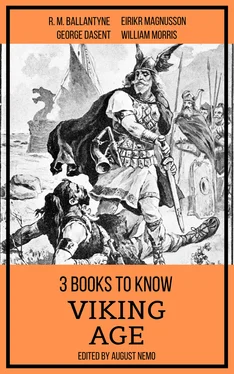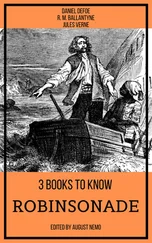That day they searched far and wide without success. Then they sat down to rest and eat. While thus engaged, Krake and Tyrker returned to the subject of the reported noisiness of Turks, and the former became so caustic in his jests that the irascible little Tyrker lost temper, much to the amusement of his comrades.
After refreshing themselves, the explorers again set out and came to a part of the country which was broken up and beautifully diversified by rocky eminences crowned with trees, and shady hollows carpeted with wild-flowers. It was difficult here to decide as to which of the innumerable valleys or hollows they should traverse; they therefore sat down again for a little to consult, but the consultation soon became a discussion, and Krake, whose spirit of fun had got the better of him, gradually edged the talk round until it came again, quite in a natural way, to the Turks. At last Tyrker became so angry that he started up, declared he would follow the party no longer, plunged into a thicket and disappeared.
He was followed by a shout of laughter, and then the others, rising, resumed their search, not doubting that their irate companion would ere long rejoin them.
But Tyrker did not join them, and when evening drew on apace they became anxious, gave up the search for vines, and went about looking for him. At last it became too dark for them to continue the search, and they were obliged to return home without their comrade.
On leaving them Tyrker had no definite idea what he meant to do or where he meant to go. He just walked straight before him in high dudgeon, taking no notice of the route by which he journeyed, or the flight of time. At length he awoke from his absent condition of mind and looked up. A vast amphitheatre of wooded hills surrounded him, and there, in the heart of a secluded dell, under a clump of trees, were the long sought and much-desired vines!
For some time Tyrker stood gazing at them in silent admiration and delight. He rubbed his eyes and looked again. Yes; there could be no question as to their reality. There hung the rich purple clusters such as he had seen on his first visit to Vinland, and such as he had been wont to see in his own land in days long gone by. He pinched himself, pulled his hair, punched his eyeballs, but no—all that failed to awaken him; from which circumstance he naturally came to the conclusion that he was awake already. He then uttered a wild, probably a Turkish, cheer, and rushed upon the spoil.
Filling both hands with the fruit he crammed his mouth full. Then he raised his eyes upwards in ecstasy and did it again. He repeated it! After which he paused to sigh, and leaped up to cheer and sat down again to—guzzle! Pardon the word, good reader, it is appropriate, for there is no disguising the fact that Tyrker was a tremendous glutton, and did not care a fig—or a grape—for appearances.
After eating for a long time he was satisfied and sat down to rest. By that time the shades of evening were falling. They proved to be soporific, for he gradually reclined backwards on the green turf and fell asleep, surrounded by and partially covered with grapes, like a drunken and disorderly Bacchus.
Now Tyrker was a man in robust health; full of energy and high spirits. Sleep therefore was to him a process which, once begun, continued till morning. Even the puckered little Snorro did not rest more soundly in his kneading-trough crib than did Tyrker on the greensward under his vinous canopy.
When next he opened his eyes, groaned, rolled over, sat up, and yawned, the sun was beginning to peep above the eastern sea.
“Ho!” exclaimed Tyrker. “I have forgot myself.” To refresh his memory he scratched his head and shook it; then he raised his eyes, saw the grapes, leaped up and burst into a fit of joyous laughter.
Thereafter he again sat down and breakfasted, after which he filled his cap, his wallet, his various pockets, the breast of his coat—every available compartment, in fact, outside as well as in—with grapes, and hastened homeward at his utmost speed in order to communicate the joyful news to his comrades.
Now the disappearance of Tyrker had caused no small amount of anxiety to his friends at the hamlet, especially to Karlsefin, who was very fond of him, and who feared that his strength might have given way, or that he had fallen into the hands of savages or under the paws of bears. He sat up the greater part of the night watching and hoping for his return, and when the first grey light of dawn appeared he called up a number of the men, and, dividing them into several bands, organised a systematic search.
Placing himself at the head of one band he went off in the direction in which, from Krake’s account of what had taken place, it seemed most probable that Tyrker might be found. They advanced so rapidly that when the sun rose they had got to within a mile or so of the spot where Krake and his party had given up their search on the previous evening. Thus it came to pass that before the red sun had ascended the eastern sky by much more than his own height, Karlsefin and Tyrker met face to face in a narrow gorge.
They stopped and gazed at each other for a few moments in silence, Karlsefin in astonishment as well—and no wonder, for the figure that stood before him was a passing strange one. To behold Tyrker thus dishevelled and besmeared was surprising enough, but to see him with grapes and vine-leaves stuffed all about him and twined all round him was absolutely astounding. His behaviour was little less so, for, clapping his hands to his sides, he shut his eyes, opened his big mouth, and burst into an uproarious fit of laughter.
The men who came up at that moment did so also for laughter is catching.
“Why, Tyrker, where have you been?” demanded Karlsefin.
“Grapes!” shouted Tyrker, and laughed again.
“Are these grapes?” asked Karlsefin, regarding the fruit with much interest.
“Ay, grapes! vines! Vinland! hurrah!”
“But are you sure?”
Instead of answering, Tyrker laughed again and began to talk, as he always did when greatly moved, in Turkish. Altogether he was so much excited that Krake said he was certainly drunk.
“Drunk!” exclaimed Tyrker, again using the Norse language; “no, that is not possible. A man could not get drunk on grapes if he were to eat a ship-load of them. I am only joyful—happy, happy as I can be. It seems as if my young days had returned again with these grapes. I am drunk with old thoughts and memories. I am back again in Turkey!”
“Ye couldn’t be in a worse place if all accounts be true,” said Krake, with a grin. “Come, don’t keep all the grapes to yourself; let us taste them.”
“Ay, let us taste them,” said Karlsefin, advancing and plucking a bunch from Tyrker’s shoulders.
The others did the same, tasted them, and pronounced the fruit excellent.
“Now, lads, we will make the strong drink from the grapes,” said Tyrker. “I don’t know quite how to do it, but we will soon find out.”
“That you certainly shall not if I can prevent it,” said Karlsefin firmly.
Tyrker looked a little surprised, and asked why not.
“Because if the effect of eating grapes is so powerful, drinking the strong drink of the grape must be dangerous. Why do you wish to make it?”
“Why? because—because—it does make one so happy.”
“You told us just now,” returned Karlsefin, “that you were as happy as you could be, did you not? You cannot be happier than that—therefore, according to your own showing, Tyrker, there is no need of strong drink.”
“That’s for you,” whispered Krake to Tyrker, with a wink, as he poked him in the side. “Go to sleep upon that advice, man, and it’ll do ye good—if it don’t do ye harm!”
“Ease him of part of his load, boys, and we shall go back the way we came as fast as may be.”
Читать дальше












